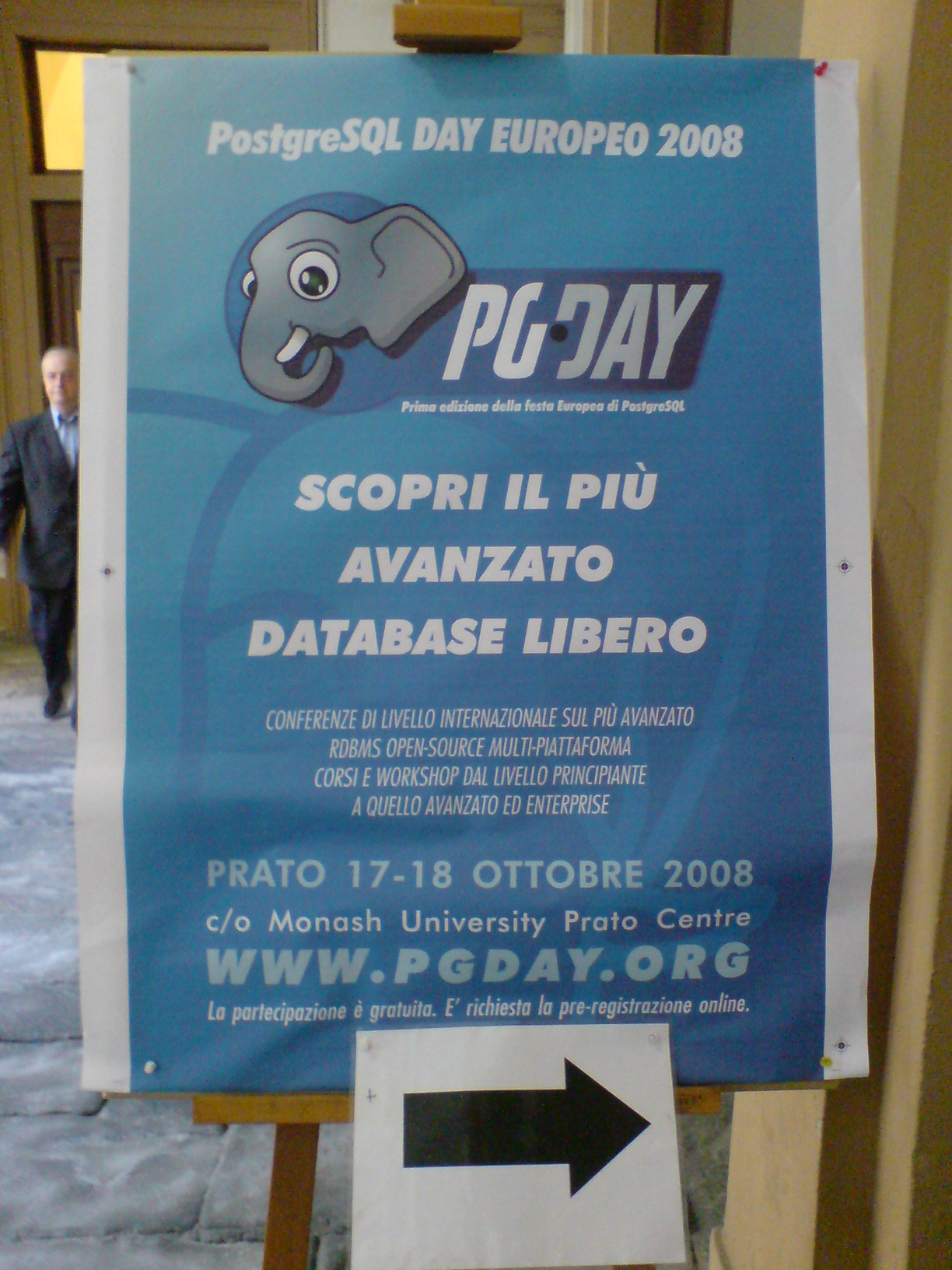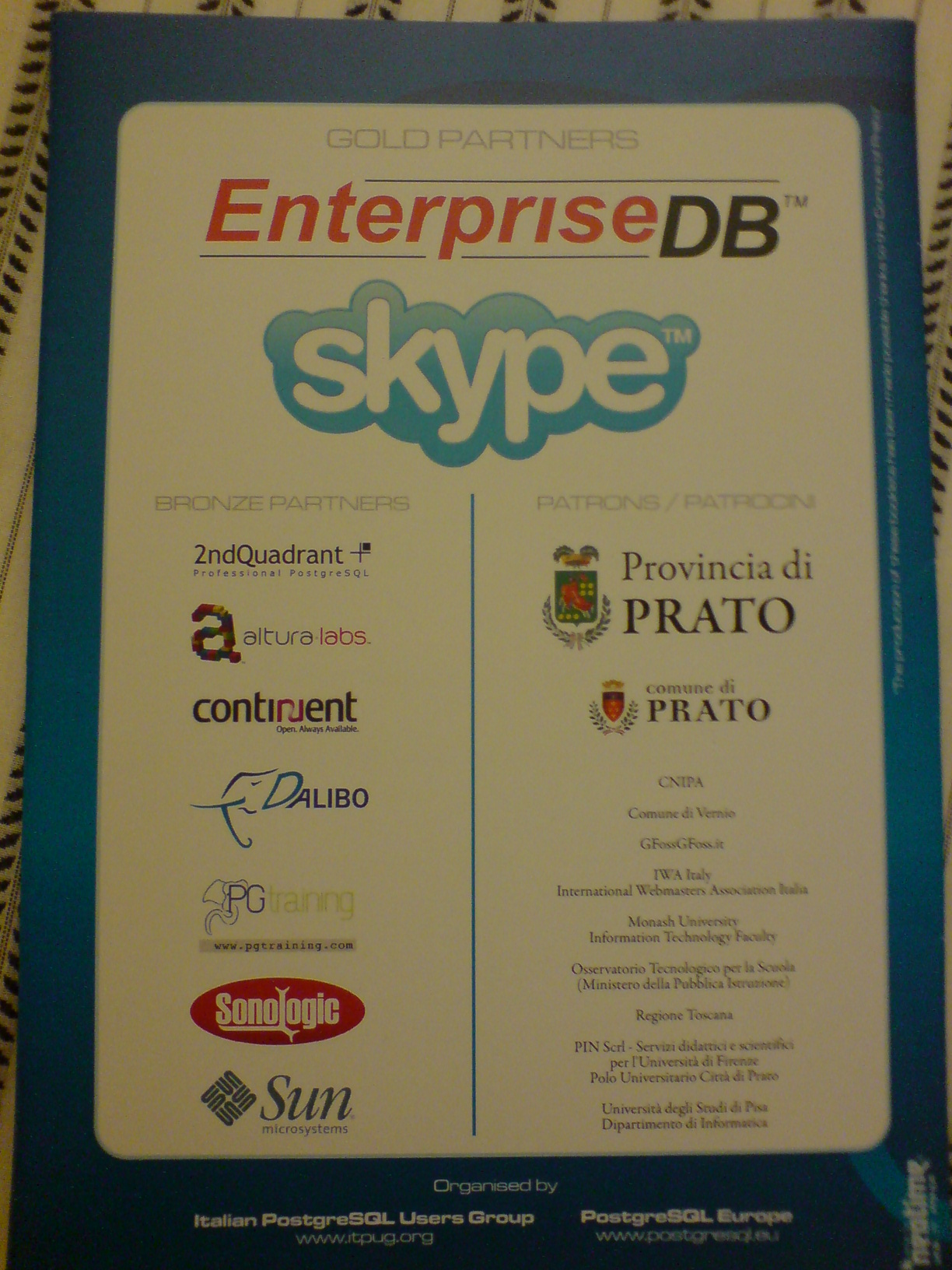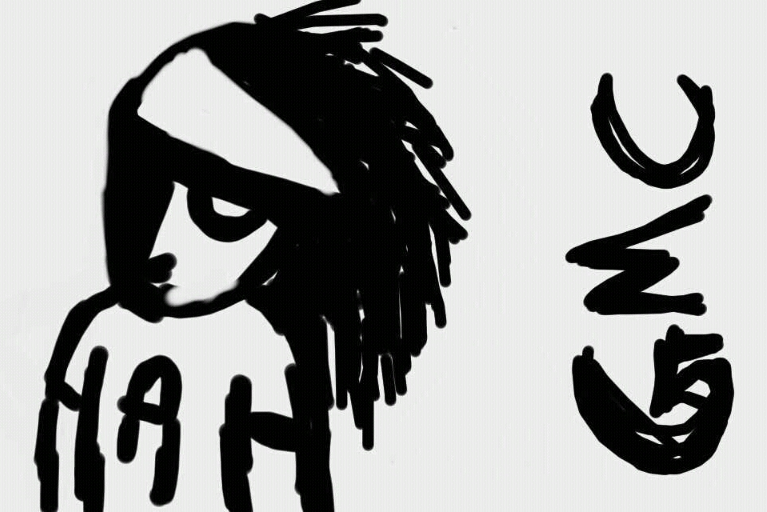Archive for the 'International' Category
Saturday, October 18th, 2008

Sign at entrance of PGday. I’ve been in Prato for the last two days (well, actually, only two nights) for the first official european PGday! PGday is a gathering of PostgreSQL geeks from europe and beyond. For those that might be wondering what PostgreSQL is, it is the leading open-source database software. Whereas most people might know mysql from their website hosters, PostgreSQL is used by anyone with serious database needs (say, databases with sizes in gigabytes to terrabytes) and increasingly is the choice for enterprises using oracle or informix before.
So i’m once more visitting the country of icecream, pasta, using the car horn instead of the blinkers and a requirement to put your ID on file before being allowed to go on the internet. The venue is Monash university, in a nice old building not far from the local castle. I haven’t seen that much from the city though, as the hotel is only 5 minutes walking distance. On my first night, i had the company of two mosquito’s in my room. I didn’t get much sleep until after i terminated those.
PGday is like a warm bath, the PostgreSQL community is one of those communities that just feels good. I see a lot of familiar faces, people i already met at fosdem 2008. But a lot of new faces too. The european PGday is a combination with the Italian PGday. In fact, last year it was called the Italian PGday. But it had such attraction to non-Italians, plus the fact that in february the European user group was formed, that this year it is truly european. The intention is to make it a yearly event.
We are now on the beginning of day 2, with a lecture by David Fetter about one of the many great new features: recursive queries. Yesterday, there were already some lectures on more new features: windowing functions among them. They’re great for time-series analysis, among other uses. Later today there will be a talk about in-place upgrades, which I hope promises to enable upgrades between major version numbers (eg. 8.2 to 8.3). Upgrading to a new major version is now more often than not delayed (or even skipped) because the down-time that comes with a dump-restore cycle on big databases is not acceptable in mission-critical databases.
Next to those DBA-targetted talks, there is a track for developers too, that starts with the next talk (the one i’m waiting for now in one of the nice bars in the building). What I personally would have like to have seen is sort of an introduction to the PostgreSQL code base. I haven’t yet gotten my hands dirty on any serious PostgreSQL development, apart from some small tours in the codebase to check why a certain feature did this or that.

Back of program leaflet. One thing that became clear from the keynote speech is that the development model that has been in use for the 10 years that PostgreSQL is in existence so far is not suited for the continued growth of the project. As more and more developers and users are getting involved with the development process, a new model is needed. Changes are being made currently to accommodate the growth of the project. And this is perhaps a way for me to start a career as a PostgreSQL developer too: there is a need for patch-reviewers. Initially, one would review the patch on the basis of some basic rules (i’d guess mostly syntax and style). A great way to get to know the various parts of the codebase from up close.
I’ve been a PostgreSQL user and DBA for a while now, and recently I decided to make it one of 2 specialisations of my company Sonologic. As you can see on the leaflet on the right, Sonologic is one of the sponsors of this event. It is a small chance to do something back for all those people that created and still maintain PostgreSQL. Hopefully, in the future I will be able to do even more!
At least the meeting has instilled some fresh enthousiasm in getting something like a DBPUG off the ground: a Dutch-Belgian PostgreSQL Usergroup. At the very least, i’ll be manning a PostgreSQL booth at T-Dose together with one or two other Dutch PostgreSQL enthousiasts. I must nog forget to ask whether I can take some leftover shirts and other swag to sell. But now, the talk about custom indexing with GiST indices is starting so time to log-off!

Posted in English, International, postgresql, Science 'n stuff | No Comments »
Thursday, August 21st, 2008
Request for Design
- HAR2009 (see below) needs a good looking and strong graphical style for communicating what it stands for.
Some of you are probably very competent designers, or might know some. Thus, this ‘call for designs’!
The winning designer will get immortal fame and lots of kudo’s. Also, and this is with a lot of buts and maybes, but there might be some form of monetary compensation involved.
A good thing to keep in mind is print-ability, we want to be able to send it off to printers for t-shirts and the like.
Photos or high-color-depth images would work less for that, vector designs (svg, ai, eps) would be preferable.
The design will be used for:
- T-shirts
- Poster
- Flyers
- Websites
- On-site artwork
Licensing
We need to be able to use the design for merchandise, and papers should be able to print it.
We are currently thinking about cc-by-sa, so if you supply a design please take into consideration that some such license must be applied for the design to be usable for the event.
If you have questions or need some help to understand this requirement please do not hesitate to contact us at info@har2009.org
Submissions
Please put your design(s) on this wiki, preferably as a seperate page under the Design: namespace (eg, a page named Design:GmcsCoolDesign).
Make sure to include the page in the ‘Design Contest Entry’ category (by including the text ‘[[Category:Design Contest Entry]]’ in your page).
- If you’re uncomfortable with the wiki, you may alternatively send your design to info@har2009.org.
It is not a problem if this is an jpg/png file as this will be for demonstration purposes only.
Deadline
The deadline for submissions is October 1st 2008, the ‘winner’ will be chosen by October 8th 2008.
Inspiration
- Short event description
- HAR2009 is an international conference where central themes are technology, society and (computer-) security. It is the 6th event in a series of succesfull events happening every 4 years.
- Activities during the event are traditionally lectures and workshops in tents by international experts and new talent discussing recent developments. Starting with the first edition, when internet was not as omni-present as it is today, we had an in-promptu network with connection to the internet at the event.
- Previous editions can be found at :
- The design should incorporate or transfer the idea/image of
-
- Something that can be asociated with random/chaos/mess or random functions or sources;
- Something computer/hacker related;
- Maybe something in relation to the outdoors;
- Think colors, think HIP(’97), think woodstock.
- No pirates!
- The name har2009 will probably sound somewhat piratey, and since the internet pirate scene is mostly known as a bunch of music and movie “sharing” thiefs the HAR2009 theme should not be targeted at pirates. The tongue-in-cheek reference to pirates should be very implicit only in the three-letter acronym HAR.
- Extra input (external links about what Random can be)
-
-
chaos, self-emerging properties, which describes the way these events work
- — at random : without definite aim, direction, rule, or method

Posted in English, International, Science 'n stuff | No Comments »
Friday, July 25th, 2008
The genie has been out of the bottle for about a week now: a group is getting together to organise the WhatTheHack sucessor. For those of you who don’t know, WhatTheHack was the 5th in a series of four-yearly Dutch outdoor hacker events. Earlier it became apparent that the crew that organised WhatTheHack was not inclined to repeat the feat in 2009, the scheduled year for the next event.
As it happens, i’m implicating myself as quite an important part of the organisation of har (the working title for now), and tonight we had our first meeting. At first, it seemed that a lot of people agreed that the event should happen (to quote Dutch hacker guru Rop Gonggrijp: ‘our events have been and continue to be important milestones in hacker culture and .. they serve as places in space and time for the hacker community to get together‘) but none were too inclined to spend some serious time on it.
Tonight, however, it turned out we have (in my eyes) enough critical mass to make this thing happen. A group of around 15 people got together, with some more not being able to make it on such short notice but very eager to join. Of those 15 a handful is really diving into this project, while others have pledged whatever time they can free. We have a nice mix of “old-timers” and “newbies”, people who have been around since hip or even before, and newbies who have jumped on the bandwagon around hal2001 (even though i had a subscription to hack-tic, my first event was hal2001 so i’m one of the newbies).
I’m glad we will have an event in 2009. I have been looking forward to it since 2005, although i didn’t fathom then the role i would take in this new event. Time is short though, slightly more than a year. The next weeks will be spent creating rough budget plans, scouting locations. And then there’s the program.
Although we only have been at it for 1.5 weeks now, people are mailing that they will come, want to volunteer and are happy that the event is being planned! We might not be the same people that organised it in 2005, 2001, 1997, etc.. (although that is not entirely true of course, some of us have been around from the very beginning), our hearts are with the event.
2009: Hacking At Random!

Posted in English, International, Science 'n stuff | No Comments »
Tuesday, July 8th, 2008
“Eerdergenoemde projecten, als PostgreSQL en XWiki, hebben aangetoond baat te hebben gehad bij een ‘enterprise’-tak. Ik zie geen reden waarom dat bij TWiki anders zou zijn.”, schreef ik bijna een jaar geleden op livre.nl. Van die positieve insteek is weinig meer over. Sinds de komst van twiki.net, de enterprise-tak waarover ik schreef, is TWiki in een diepe crisis geraakt.
TWiki.NET (de commerciele variant) is als een tsunami over het opensource project TWiki.org gerold. TWiki.NET zou de community gaan versterken, maar vergat daarbij bestaande structuren te respecteren. Zonder blikken of blozen kwam de marketing-afdeling met leuzen waarin het werk van de vele mensen die in de loop der jaren aan TWiki bij hebben gedragen werd geclaimd als hun eigen.
De laatste release is versie 4.2, ruim een half jaar oud. Inmiddels zijn al flink wat bugs in deze release ontdekt, waarvan enkelen zelfs de veiligheid van een TWiki installatie in gevaar brengen. De langverwachte patch-versie, 4.2.1, wil maar niet komen. Het beste voorbeeld waarom je niet TWiki zou moeten gebruiken is de website van twiki zelf: de site is traag, onoverzichtelijk en volgens velen simpelweg lelijk. Ontwikkelaars van de kern van TWiki laten het afweten. De community valt uiteen.
Falende organisatie
Wie gaat graven in de historie van TWiki, door in de project-wiki op twiki.org zelf te kijken en met mensen die al jaren in het project zitten te spreken, komt er echter achter dat dit eigenlijk niets nieuws is. Het project hinkt al jaren op deze wijze voort. Slechts een handjevol programmeurs die de TWiki code hebben ontwikkeld en deze van binnen en van buiten kennen hebben het langer dan, zeg, 2 jaar volgehouden. Anderen liepen stuk op de machtsstructuur van het project. De paar oudgedienden kunnen uren verhalen over mensen die kwamen, afgestompt raakten en weer vertrokken.
Wat TWiki mist is een inspirerende leider. Wat TWiki heeft is een zelfbenoemde ‘benevolent dictator‘, een goedaardige dictator: oprichter Peter Thoeny. Op zich is er niets mis met een ‘benevolent dictator’. Veel open-source projecten kennen zo’n persoon: linux heeft Linus Torvalds, ubuntu heeft Mark Shuttleworth, PostgreSQL heeft Tom Lane, perl heeft Larry Wall, en ga zo maar door. Het grote verschil is dat zij respect hebben verdiend, dat zij mensen hebben weten te inspireren. Ik ben van mening dat wanneer je zelf moet stellen ‘ik ben de goedaardige dictator’, het predicaat ‘goedaardig’ niet meer van toepassing kán zijn.
Daarnaast, nu Peter Thoeny naast leider van TWiki.org ook grote financiele belangen heeft met TWiki.NET, begint de grens tussen beiden te vervagen. Daar komt bij dat Thoeny de enige link tussen de open-source community en het commerciele bedrijf is. Wie kijkt naar de publieke uitspraken van Thoeny over (in zijn perceptie) ‘tegenstanders’ moet vrezen voor het beeld dat medewerkers van TWiki.NET gepresenteerd krijgen van toegewijde leden van de open-source community. Met valse informatie worden ze zonder blikken of blozen zwartgemaakt.
Toekomst
Hoe ziet de toekomst er uit voor TWiki? De codebase van TWiki is complex. Nieuwe ontwikkelaars zullen dan ook een steile leercurve hebben als de oudgedienden het echt voor gezien houden. Intussen wordt druk gesproken over de machtskwestie, voor een groot deel van hen is het naar ieders tevredenheid oplossen daarvan een belangrijke voorwaarde om weer aan de slag te gaan. De discussie hierover verloopt echter moeizaam en zeer behoedzaam, kritiek kan eigenlijk nauwelijks geuit worden (had iemand het over dictatuur?).
Natuurlijk, TWiki.net kan ontwikkelaars inhuren of zelfs in dienst nemen. Een gelikte versie maken, waarvan een bruikbare maar minder gelikte versie als open-source wordt vrijgegeven. Het MySQL model. Op zich niets mis mee, maar het maakt het voor mij een stuk minder interessant om actief aan bij te dragen. En wie weet, zo af en toe valt het f-woord: een fork zou een uitweg kunnen bieden uit de huidige impasse. Ik zeg dat echter met enige reserve, omdat het opsplitsen van een project eigenlijk zelden tot goede resultaten leidt.
Gelukkig is TWiki, hoewel in potentie wel degelijk, niet uniek. Er zijn meerdere oplossingen voor de problemen waar TWiki een antwoord op is. Oplossingen die mischien op bepaalde gebieden krachtiger zijn dan TWiki, oplossingen die zeker gebruikersvriendelijker zijn dan TWiki. Hoewel ik het jammer zou vinden als TWiki zich niet zou ontwikkelen naar de belofte die het in zich heeft, heb ik de vrijheid een van de alternatieven in te zetten. Er zijn echter mensen die zich uitsluitend specialiseren op TWiki. Zij zijn danig de pineut wanneer TWiki het onderspit delft.
Ik denk dat de meest waarschijnlijke uitkomst het MySQL model is, waarbij de bestaande community wordt vervangen door een betaalde community. Maar het is natuurlijk heel goed mogelijk dat ik er, net als met mijn stuk op livre.nl, weer ver naast zit en het in de komende maanden toch nog goed komt. Ik heb er helaas een hard hoofd in.

Posted in Dutch, International, Science 'n stuff | 4 Comments »
Wednesday, February 13th, 2008

Barracuda Networks uses ClamAV anti virus software in their solutions. Anti virus developer Trend Micro accused Barracuda Networks of patent infringement with a bogus patent (as all software patents are). What Trend Micro really does is abusing the patent system and aggressively attacking ClamAV users and developers directly.
Whatever your views on software patents in general, or even the validity of this patent, suing customers is in singularly bad taste and can only damage the marketplace.
This is a dangerous act, and we call upon all software vendors and users to boycott Trend Micro and those who support them, to prevent this abusive behaviour becoming a BAD TREND which will be bad for software business worldwide.
Like SCO, Trend Micro has exceeded the boundary of decent and respectable commerce, it has become a pariah and should be punished.

Posted in English, International, Science 'n stuff | 2 Comments »
|
|



